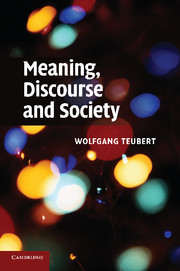Book contents
- Frontmatter
- Contents
- Acknowledgements
- Introduction
- Part I Meaning, the mind and the brain
- 1 The cognitive turn
- 2 The long history of mind linguistics
- 3 What do we know about mental concepts?
- 4 Morphing theoretical sémes into ‘real’ concepts
- 5 From mental representations to conceptual ontologies
- 6 What is meaning?
- 7 Where should we look for meaning?
- Part II Discourse and society
- Conclusion
- Bibliography
- Index
6 - What is meaning?
Published online by Cambridge University Press: 04 August 2010
- Frontmatter
- Contents
- Acknowledgements
- Introduction
- Part I Meaning, the mind and the brain
- 1 The cognitive turn
- 2 The long history of mind linguistics
- 3 What do we know about mental concepts?
- 4 Morphing theoretical sémes into ‘real’ concepts
- 5 From mental representations to conceptual ontologies
- 6 What is meaning?
- 7 Where should we look for meaning?
- Part II Discourse and society
- Conclusion
- Bibliography
- Index
Summary
In the past, many linguists had such a respect for meaning that they were careful to avoid the issue wherever possible. Traditionally, language study has had a strong focus on grammar. Grammar is a land of apparent law and order, in which every part ultimately finds its pigeonhole, if one sorts the elements for long enough. Words and their meanings, however, behave in a disorderly fashion. Words are ambiguous and fuzzy, as any glance at a dictionary entry will confirm. Most words, particularly the more frequent ones, come with more than one ‘sense’, and there is little agreement between dictionaries as to how many senses a given word has, or how these senses are distinguished. This may be one reason why many linguists in the twentieth century had so little patience with them. Mental concepts, on the other hand, were believed to be failsafe in this respect. Each concept was thought to represent one ‘sense’, clearly defined and unambiguously related to other concepts (such as hypernym–hyponym, part–whole, perhaps even synonym–antonym). To many linguists it therefore seemed prudent to leave the words of our natural languages to their poor cousins, the lexicographers. But this has not prevented the linguists from criticising the lexicographers for the inconsistencies that abound in even the best dictionaries, whenever the makers of our dictionaries try to make sense of their words.
For corpus linguistics, a fairly recent paradigm in language studies that has evolved over the last forty years, this picture is no longer true.
- Type
- Chapter
- Information
- Meaning, Discourse and Society , pp. 73 - 87Publisher: Cambridge University PressPrint publication year: 2010
- 1
- Cited by

